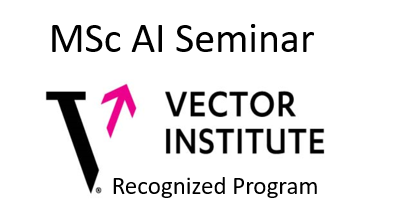Tuesday, April 4, 2023 - 12:00 to 13:30
SCHOOL OF COMPUTER SCIENCE
The School of Computer Science is pleased to present…
MSc Thesis Defense by: Regina Khalil
Date: Tuesday April 4, 2023
Time: 12:00pm – 1:30pm
Location: Essex Hall, Room 122
Reminders: 1. Two-part attendance mandatory (sign-in sheet, QR Code) 2. Arrive 5-10 minutes prior to event starting - LATECOMERS WILL NOT BE ADMITTED. Note that due to demand, if the room has reached capacity, even if you are "early" admission is not guaranteed. 3. Please be respectful of the presenter by NOT knocking on the door for admittance once the door has been closed whether the presentation has begun or not (If the room is at capacity, overflow is not permitted (ie. sitting on floors) as this is a violation of the Fire Safety code). 4. Be respectful of the decision of the advisor/host of the event if you are not given admittance. The School of Computer Science has numerous events occurring soon.
Abstract:
Knowledge graphs (KGs) use triples to describe real-world facts. They have seen widespread use in intelligent analysis and applications. However, the automatic construction process of KGs unavoidably introduces possible noises and errors. Furthermore, KG-based tasks and applications assume that the knowledge in the KG is entirely correct, which leads to potential deviations. Error detection is critical in KGs, where errors are rare but significant. Various error detection methodologies, primarily path ranking (PR) and representation learning, have been proposed to address this issue. In this thesis, we introduce the Enhanced Path Ranking Guided Embedding (EPRGE), which is an improved version of an existing model, the Path Ranking Guided Embedding (PRGE) that uses path-ranking confidence scores to guide TransE embeddings. To improve PRGE, we use a rotational-based embedding model (RotatE) instead of TransE, which uses a self-adversarial negative sampling technique to train the model efficiently and effectively. EPRGE, unlike PRGE, avoids generating meaningless false triples during training by employing the self-adversarial negative sampling method. We compare various methods on two benchmark datasets and one real-world dataset, demonstrating the potential of our approach and providing enhanced insights on graph embeddings when dealing with noisy KGs.
Keywords: Knowledge Graph, Knowledge Graph Embedding, Error Detection, Path Ranking.
MSc Thesis Committee:
Internal Reader: Dr. Kalyani Selvarajah
External Reader: Dr. Mohammad Hassanzadeh
Advisor: Dr. Ziad Kobti
Chair: Dr. Adel Abusitta
MSc Thesis Defense Announcement 
5113 Lambton Tower 401 Sunset Ave. Windsor ON, N9B 3P4 (519) 253-3000 Ext. 3716 csgradinfo@uwindsor.ca
